-
 Bitcoin
Bitcoin $83,309.8774
-1.88% -
 Ethereum
Ethereum $1,591.3660
-2.42% -
 Tether USDt
Tether USDt $0.9998
-0.01% -
 XRP
XRP $2.0864
-2.28% -
 BNB
BNB $580.9809
-0.68% -
 Solana
Solana $125.6682
-3.01% -
 USDC
USDC $0.9999
0.00% -
 TRON
TRON $0.2516
0.03% -
 Dogecoin
Dogecoin $0.1542
-3.08% -
 Cardano
Cardano $0.6142
-3.69% -
 UNUS SED LEO
UNUS SED LEO $9.3431
-0.92% -
 Chainlink
Chainlink $12.3641
-2.37% -
 Avalanche
Avalanche $18.8865
-5.31% -
 Stellar
Stellar $0.2358
-2.40% -
 Toncoin
Toncoin $2.8805
-0.91% -
 Shiba Inu
Shiba Inu $0.0...01169
-1.89% -
 Sui
Sui $2.1008
-4.00% -
 Hedera
Hedera $0.1574
-5.48% -
 Bitcoin Cash
Bitcoin Cash $318.9019
-1.04% -
 Litecoin
Litecoin $75.9077
-2.52% -
 Polkadot
Polkadot $3.5432
-3.69% -
 Dai
Dai $1.0000
0.00% -
 Bitget Token
Bitget Token $4.2538
-1.47% -
 Hyperliquid
Hyperliquid $15.1227
-5.40% -
 Ethena USDe
Ethena USDe $0.9991
0.00% -
 Pi
Pi $0.6199
-16.77% -
 Monero
Monero $217.3319
2.19% -
 Uniswap
Uniswap $5.2227
-2.58% -
 OKB
OKB $52.2436
1.28% -
 Pepe
Pepe $0.0...07082
-3.62%
Why does the blockchain need miners or validators?
Blockchain relies on miners in PoW and validators in PoS to verify transactions, prevent double-spending, and maintain network security and decentralization.
Apr 13, 2025 at 08:43 am
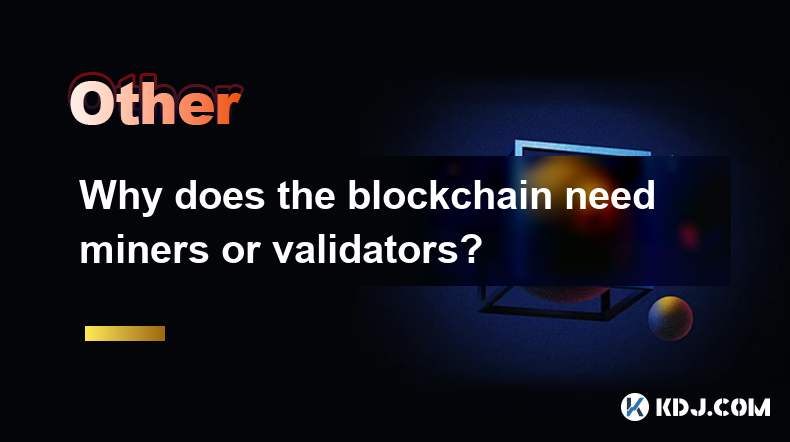
The blockchain technology, which underpins cryptocurrencies like Bitcoin and Ethereum, relies heavily on miners or validators to maintain its integrity and functionality. These participants play crucial roles in ensuring the security, decentralization, and efficiency of blockchain networks. This article delves into the reasons why the blockchain needs miners or validators, exploring their functions and importance within the ecosystem.
The Role of Miners in Proof of Work (PoW) Systems
In blockchain networks that utilize the Proof of Work (PoW) consensus mechanism, miners are essential. Their primary function is to solve complex mathematical puzzles to validate transactions and add them to the blockchain. This process, known as mining, involves:
- Verifying Transactions: Miners collect unconfirmed transactions from the network and verify their authenticity.
- Creating Blocks: Once transactions are verified, miners group them into a block.
- Solving Puzzles: Miners compete to solve a cryptographic puzzle, which requires significant computational power.
- Adding Blocks to the Chain: The first miner to solve the puzzle gets to add the new block to the blockchain and is rewarded with newly minted cryptocurrency and transaction fees.
Miners ensure that only valid transactions are added to the blockchain, preventing double-spending and maintaining the integrity of the network. Their role is critical in maintaining the decentralized nature of PoW blockchains, as no single entity can control the validation process.
The Role of Validators in Proof of Stake (PoS) Systems
In contrast to PoW, blockchain networks that use the Proof of Stake (PoS) consensus mechanism rely on validators. These participants are chosen to create new blocks based on the number of coins they hold and are willing to "stake" as collateral. The functions of validators include:
- Staking: Validators lock up a certain amount of cryptocurrency as a stake, which serves as a guarantee of their commitment to the network.
- Validating Transactions: Validators verify transactions and add them to new blocks.
- Creating Blocks: Based on their stake, validators are randomly selected to create new blocks and add them to the blockchain.
- Rewarding and Penalizing: Validators receive rewards for successfully adding blocks and can be penalized for malicious behavior.
Validators play a crucial role in maintaining the security and efficiency of PoS blockchains. By staking their own assets, they have a vested interest in the network's well-being, which discourages malicious activities and ensures the smooth operation of the blockchain.
Ensuring Security Through Decentralization
Both miners and validators contribute to the decentralization of blockchain networks. In PoW systems, the decentralized nature of mining prevents any single entity from controlling the network, as it would require an impractical amount of computational power. Similarly, in PoS systems, the selection of validators based on stake distribution ensures that no single validator can dominate the network.
Decentralization is crucial for the security of blockchain networks, as it reduces the risk of attacks and ensures that the network remains open and accessible to all participants. Miners and validators are the backbone of this decentralized structure, maintaining the integrity and trustworthiness of the blockchain.
Preventing Double-Spending and Ensuring Transaction Validity
One of the primary reasons blockchain networks need miners or validators is to prevent double-spending. Double-spending occurs when an individual attempts to spend the same cryptocurrency more than once. Miners and validators verify each transaction to ensure that the sender has the necessary funds and that the transaction is valid before adding it to the blockchain.
Transaction validation is a critical function that ensures the reliability of blockchain networks. By confirming the authenticity and validity of transactions, miners and validators maintain the trust and confidence of users in the system.
Incentivizing Participation and Network Maintenance
Miners and validators are incentivized to participate in blockchain networks through rewards. In PoW systems, miners receive newly minted cryptocurrency and transaction fees for successfully adding blocks to the blockchain. In PoS systems, validators earn rewards for creating new blocks and maintaining the network.
These incentives are essential for the ongoing operation and maintenance of blockchain networks. They encourage participants to invest in the necessary hardware and resources to mine or validate transactions, ensuring the network's continuous operation and growth.
Facilitating Network Consensus
Achieving consensus is a fundamental aspect of blockchain technology. Miners and validators play a crucial role in reaching consensus on the state of the blockchain. In PoW systems, consensus is achieved when the majority of miners agree on the validity of a block. In PoS systems, consensus is reached through the random selection of validators based on their stake.
Consensus mechanisms ensure that all participants in the network agree on the order and validity of transactions, maintaining the integrity and consistency of the blockchain. Without miners or validators, it would be impossible to achieve this consensus, rendering the blockchain ineffective.
Frequently Asked Questions
Q: Can a blockchain function without miners or validators?
A: No, a blockchain cannot function effectively without miners or validators. These participants are essential for verifying transactions, adding them to the blockchain, and maintaining the network's security and integrity. Without them, the blockchain would be vulnerable to attacks and unable to achieve consensus.
Q: How do miners and validators differ in their roles?
A: Miners in PoW systems solve complex mathematical puzzles to validate transactions and add them to the blockchain, while validators in PoS systems are chosen based on their stake to create new blocks and validate transactions. Both roles are crucial for maintaining the blockchain's integrity, but they operate under different consensus mechanisms.
Q: What happens if a miner or validator acts maliciously?
A: In PoW systems, if a miner attempts to add invalid blocks, other miners will reject these blocks, preventing them from being added to the blockchain. In PoS systems, validators who act maliciously can be penalized by losing their stake, which serves as a deterrent against malicious behavior.
Q: How does the reward system for miners and validators work?
A: Miners in PoW systems are rewarded with newly minted cryptocurrency and transaction fees for successfully adding blocks to the blockchain. Validators in PoS systems earn rewards for creating new blocks and maintaining the network, with the rewards typically coming from transaction fees and, in some cases, newly minted cryptocurrency.
Disclaimer:info@kdj.com
The information provided is not trading advice. kdj.com does not assume any responsibility for any investments made based on the information provided in this article. Cryptocurrencies are highly volatile and it is highly recommended that you invest with caution after thorough research!
If you believe that the content used on this website infringes your copyright, please contact us immediately (info@kdj.com) and we will delete it promptly.
- Movement Labs and the Movement Network Foundation have launched an independent investigation into recent market-making irregularities related to the MOVE token.
- 2025-04-16 09:15:12
- Shiba Inu (SHIB) burn rate saw an over 2000% hike, leading to the removal of 20.83 million tokens from circulation.
- 2025-04-16 09:15:12
- Securitize Acquires MG Stover's Fund Administration Business to Become the Largest Digital Asset Fund Administrator
- 2025-04-16 09:10:12
- Trump administration plans to present Congress with cuts to most funding for public media
- 2025-04-16 09:10:12
- XRP (XRP) Displays Promising Growth Potential as It Currently Trades Above $2.00 and the 21-week EMA
- 2025-04-16 09:05:13
- BYDFi Lists $KERNEL, the Governance Token of KernelDAO, with Spot Trading Now Live
- 2025-04-16 09:05:13
Related knowledge
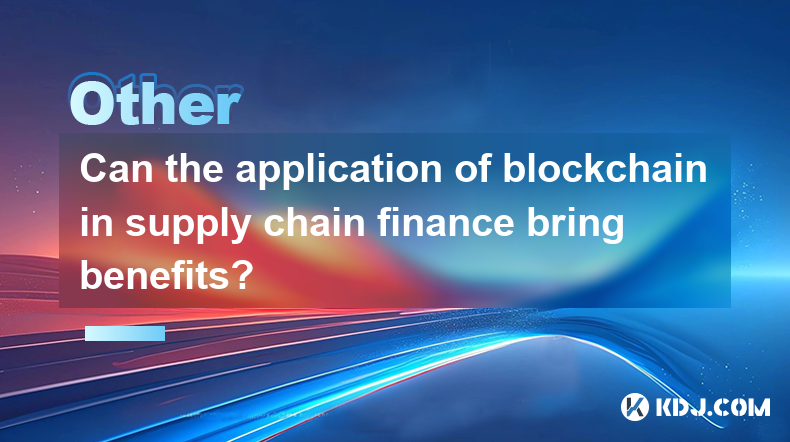
Can the application of blockchain in supply chain finance bring benefits?
Apr 15,2025 at 04:00pm
Can the application of blockchain in supply chain finance bring benefits? The integration of blockchain technology into supply chain finance has garnered significant attention in the cryptocurrency and financial sectors. This article explores how blockchain can potentially revolutionize supply chain finance, detailing its benefits and providing a compre...

Does the ranking of Chinese blockchain apps include cross-chain applications?
Apr 14,2025 at 04:00pm
The ranking of Chinese blockchain apps is a comprehensive evaluation that takes into account various aspects such as user base, transaction volume, and technological innovation. A pertinent question arises regarding whether these rankings include cross-chain applications. Cross-chain applications, which allow different blockchain networks to interact an...
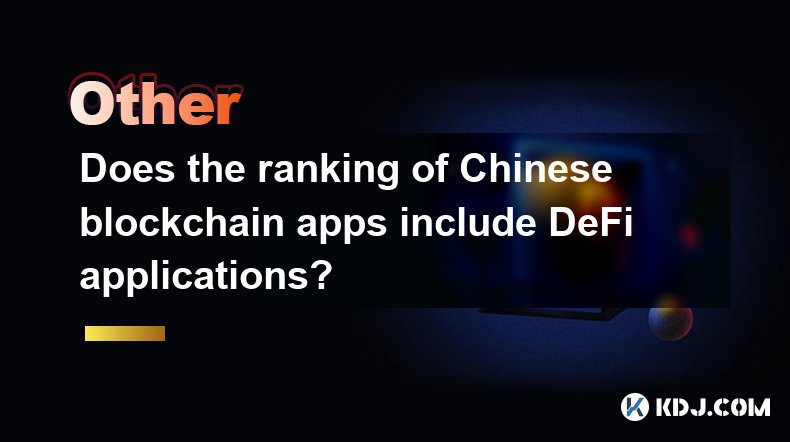
Does the ranking of Chinese blockchain apps include DeFi applications?
Apr 15,2025 at 06:57am
The ranking of Chinese blockchain apps is a comprehensive list that showcases the most popular and influential applications within the cryptocurrency ecosystem. One question that often arises is whether these rankings include DeFi applications. To answer this, we need to delve into the specifics of how these rankings are compiled and what types of appli...
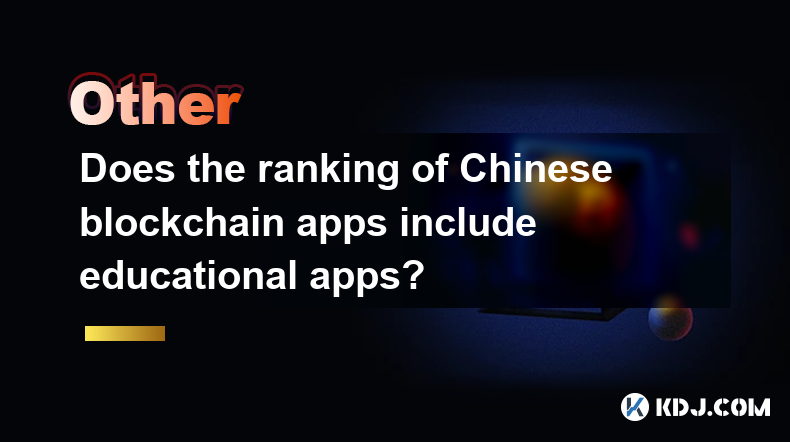
Does the ranking of Chinese blockchain apps include educational apps?
Apr 16,2025 at 03:35am
The ranking of Chinese blockchain apps often includes a variety of categories, from finance and gaming to social networking and beyond. One question that frequently arises is whether these rankings include educational apps. To address this, we need to delve into the specifics of how blockchain apps are categorized and ranked in China, and whether educat...
Does the ranking of Chinese blockchain apps include enterprise-level applications?
Apr 15,2025 at 06:42am
The ranking of Chinese blockchain apps often includes a variety of applications, ranging from consumer-focused to enterprise-level solutions. Understanding the scope and criteria for these rankings is essential to determine if enterprise-level applications are included. This article delves into the specifics of how Chinese blockchain app rankings are co...
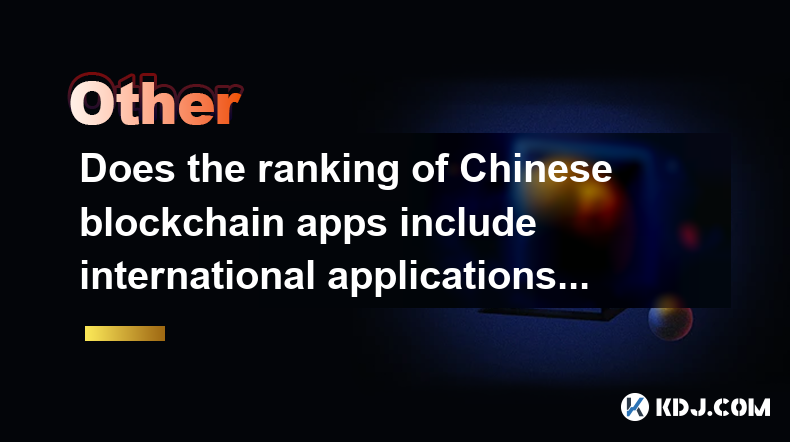
Does the ranking of Chinese blockchain apps include international applications?
Apr 16,2025 at 04:07am
The ranking of Chinese blockchain apps primarily focuses on applications developed and predominantly used within China. However, the question of whether these rankings include international applications is an intriguing one that warrants a detailed exploration. In this article, we will delve into the criteria used for ranking Chinese blockchain apps, th...

Can the application of blockchain in supply chain finance bring benefits?
Apr 15,2025 at 04:00pm
Can the application of blockchain in supply chain finance bring benefits? The integration of blockchain technology into supply chain finance has garnered significant attention in the cryptocurrency and financial sectors. This article explores how blockchain can potentially revolutionize supply chain finance, detailing its benefits and providing a compre...

Does the ranking of Chinese blockchain apps include cross-chain applications?
Apr 14,2025 at 04:00pm
The ranking of Chinese blockchain apps is a comprehensive evaluation that takes into account various aspects such as user base, transaction volume, and technological innovation. A pertinent question arises regarding whether these rankings include cross-chain applications. Cross-chain applications, which allow different blockchain networks to interact an...

Does the ranking of Chinese blockchain apps include DeFi applications?
Apr 15,2025 at 06:57am
The ranking of Chinese blockchain apps is a comprehensive list that showcases the most popular and influential applications within the cryptocurrency ecosystem. One question that often arises is whether these rankings include DeFi applications. To answer this, we need to delve into the specifics of how these rankings are compiled and what types of appli...

Does the ranking of Chinese blockchain apps include educational apps?
Apr 16,2025 at 03:35am
The ranking of Chinese blockchain apps often includes a variety of categories, from finance and gaming to social networking and beyond. One question that frequently arises is whether these rankings include educational apps. To address this, we need to delve into the specifics of how blockchain apps are categorized and ranked in China, and whether educat...

Does the ranking of Chinese blockchain apps include enterprise-level applications?
Apr 15,2025 at 06:42am
The ranking of Chinese blockchain apps often includes a variety of applications, ranging from consumer-focused to enterprise-level solutions. Understanding the scope and criteria for these rankings is essential to determine if enterprise-level applications are included. This article delves into the specifics of how Chinese blockchain app rankings are co...

Does the ranking of Chinese blockchain apps include international applications?
Apr 16,2025 at 04:07am
The ranking of Chinese blockchain apps primarily focuses on applications developed and predominantly used within China. However, the question of whether these rankings include international applications is an intriguing one that warrants a detailed exploration. In this article, we will delve into the criteria used for ranking Chinese blockchain apps, th...
See all articles























































































